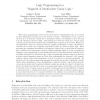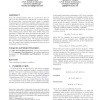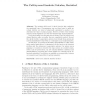618 search results - page 93 / 124 » Computational Models of Natural Language Argument |
LICS
1991
IEEE
13 years 12 months ago
1991
IEEE
When logic programming is based on the proof theory of intuitionistic logic, it is natural to allow implications in goals and in the bodies of clauses. Attempting to prove a goal ...
CMSB
2011
Springer
12 years 8 months ago
2011
Springer
From the phosphorylation state of a molecule to the volume of a cell, parameters are ubiquitous in systems biology. At the same time, most models involve static or dynamic compart...
ASP
2003
Springer
14 years 1 months ago
2003
Springer
Disjunctive Logic Programming (DLP) is an advanced formalism for Knowledge Representation and Reasoning (KRR). DLP is very expressive in a precise mathematical sense: it allows to ...
IR
2006
13 years 8 months ago
2006
Abstract. Peer-to-peer (P2P) networks integrate autonomous computing resources without requiring a central coordinating authority, which makes them a potentially robust and scalabl...
ESOP
2012
Springer
12 years 4 months ago
2012
Springer
The existing call-by-need λ calculi describe lazy evaluation via equational logics. A programmer can use these logics to safely ascertain whether one term is behaviorally equivale...



